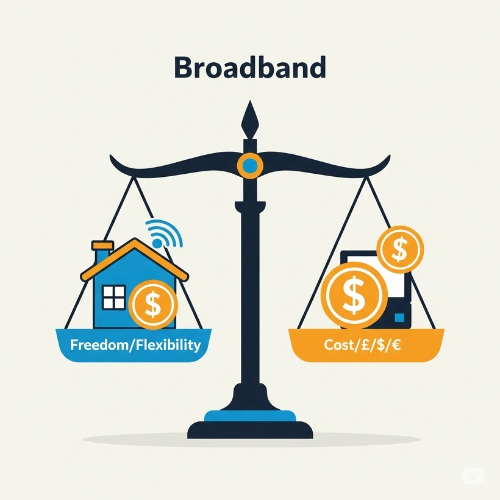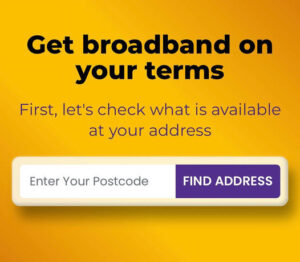What Is Rolling Contract Broadband? Pros, Cons & Who It’s Best For in 2025

Tired of broadband deals that feel like a trap?
You’re not the only one.
Maybe you’re in a short-term rental. Maybe you’re moving soon. Or maybe you just can’t stand being locked into another 18-month broadband contract that punishes you for changing your mind.
That’s where rolling contract broadband comes in — and yes, it’s a real alternative to long-term tie-ins (without the usual gotchas).
But here’s the kicker:
A lot of people think rolling broadband is the same as no-contract or pay-as-you-go internet. It’s not. And if you don’t know the difference, you could end up overpaying or stuck with a plan that doesn’t work for your situation.
In this guide, you’ll get a straightforward breakdown of:
- What exactly rolling contract broadband means in the UK
- How it works, who it’s designed for, and whether it’s really flexible
- The pros and cons — including a few that most comparison sites don’t mention
- How it stacks up against no-contract broadband (with a side-by-side table)
- The best rolling broadband deals in 2025, broken down by provider and use case
By the end, you’ll know exactly whether a rolling broadband plan is right for you — or if you’re better off with another type of flexible internet.
Let’s break it down.
What Is Rolling Contract Broadband?

Rolling contract broadband is internet you pay for month by month — no 12, 18, or 24-month tie-ins.
You get fast internet on a 30-day rolling basis. That means:
- You pay monthly
- You can cancel anytime (usually with 30 days’ notice)
- No early termination fees
- No being stuck in a deal you don’t want
It’s also called:
- One-month broadband
- Flexible broadband plan
- No commitment broadband
- Monthly broadband deals
But at the core, they all mean the same thing: broadband without long-term contracts.
How Does Rolling Broadband Work?
It’s refreshingly simple. Here’s the typical process:
- Choose a provider that offers rolling contracts (we’ll cover the best ones later)
- Sign up online — some even let you skip the credit check
- Receive your router (usually by post)
- Plug it in and go live — often within 2–5 working days
- Cancel anytime with 30 days’ notice if you want to switch or leave
That’s it. No exit penalties, no drawn-out cancellation calls, and no “you signed for 24 months” drama.
Heads up: You’re still technically signing a contract — just one that renews every 30 days and doesn’t punish you for leaving.
How Is It Different from No Contract Broadband?
Here’s where most people get tripped up:
Rolling contract broadband = short-term, 30-day renewable agreement
No contract broadband = usually the same thing (in the UK), just different wording
In the UK broadband world, “no contract” and “rolling contract” are used interchangeably — but always check the small print. Some “no contract” plans actually include:
- One-off setup or activation fees
- Router return charges
- Cancellation notice periods
So even if the headline says “no contract broadband,” there’s usually a rolling 30-day agreement underneath. It’s flexible, but not totally “no strings attached.”
Want true “plug and play” freedom? Look for broadband plans with:
- No setup costs
- No credit checks
- Free router included
- Cancel-anytime policy
Bottom Line?
If you want reliable internet without a long-term lock-in, rolling contract broadband is as close as it gets. You stay in control, you pay as you go, and you’re not tied down.
Who Is Rolling Contract Broadband Best For?

Here’s the deal: rolling contract broadband isn’t for everyone. But if you’re even slightly fed up with being locked into a long-term broadband plan, this is probably exactly what you need.
Let’s break it down by real-life scenarios
Students & Shared Housemates
Living in a student flat or shared house? Then you know how chaotic internet bills can get when someone suddenly moves out or ghosts rent.
With a rolling broadband deal, you can:
- Split costs without drama
- Avoid long contracts you’ll never finish
- Cancel easily when term ends or housemates change
Plus, many monthly broadband plans for students don’t need a credit check — ideal if you’re just getting started financially.
Example:
You’re in uni housing for 9 months. Locking into a 24-month broadband contract? Pointless. A 30-day plan lets you keep it short and sweet.
People Between Homes or Moving Soon
If you’re:
- In a short-term let
- Moving city for work
- Living somewhere temporarily
- Waiting for your mortgage to go through
…a long-term broadband contract is just going to slow you down.
Rolling contract broadband means you can get online fast — then cancel the moment you move. No arguing with customer service, and no early exit fees.
Pro tip: Look for providers that offer quick broadband setup — some get you connected in under 48 hours.
Freelancers, Digital Nomads & Remote Workers
Working from cafes, coworking spaces, or your Airbnb?
You need internet that moves with your life — not the other way around.
Here’s how monthly rolling broadband helps:
- Upgrade or downgrade your speed anytime
- Switch to a new provider if coverage is better
- No long-term risks when your location changes
Whether you’re freelance, hybrid, or just hopping cities — flexible broadband plans keep you connected without the commitment.
Airbnb Hosts & Short-Term Rental Owners
If you run a short-term let, Airbnb, or holiday cottage, you probably don’t want to fork out for internet year-round — especially if the place isn’t always booked.
With rolling broadband, you can:
- Offer WiFi when guests are staying
- Pause or cancel when the property is empty
- Avoid paying for months you don’t need
Bonus: Some providers let you pause service temporarily, which is ideal for seasonal rentals.
People Testing a New Provider (Smart Move)
Here’s something smart that not enough people do:
Test the broadband before committing.
You don’t have to sign a 2-year contract to see if the provider actually delivers good speeds. Instead:
- Get a one-month internet deal
- Try it for 30 days in real-world use
- Upgrade to a long-term plan only if you’re happy
It’s like dating your broadband before marrying it.
Who Should Skip Rolling Broadband?
This isn’t a one-size-fits-all setup. You might be better off with a 12 or 24-month plan if:
- You’re settled in a home long-term
- You want the lowest monthly price
- You like bundle deals (TV, phone, etc.)
Long contracts often come with perks — like free setup, cashback, or discounts. If stability beats flexibility in your life right now, go long-term.
TL;DR – Is Rolling Broadband Right for You?
Go for it if you’re:
- A student
- In short-term housing
- Working remotely or freelance
- Running a rental property
- Testing a new provider
- Just hate being tied down
If you tick one or more of those boxes, rolling broadband is built for you.
Pros and Cons of Rolling Contract Broadband (The Honest Truth

Let’s cut through the noise. You’re here because you want flexible broadband — without the lock-in, exit fees, or commitment.
But just because something’s flexible doesn’t mean it’s perfect.
Here’s exactly what you gain and what you give up when you choose rolling contract broadband:
The Pros (Why People Love It)
1. Cancel Anytime Without Penalties
The biggest win? Freedom.
Rolling broadband plans are 30-day contracts, not 18-month traps. That means you can:
- Cancel with just 30 days’ notice
- Switch to another provider with zero drama
- Stop paying the moment your situation changes
No early exit fees, no guilt, and no customer service nightmares.
2. Ideal for Temporary Living Situations
Let’s say you’re:
- Renting for 3–6 months
- Between homes
- Travelling or staying with family temporarily
Getting locked into a long-term broadband contract in those cases? Totally pointless.
One-month broadband deals let you stay online without the baggage.
3. Faster Setup = Get Online in Days
Most rolling contract broadband providers offer rapid activation. Some can even get you live within 24–48 hours — especially if you opt for plug-and-play routers.
That’s game-changing if you’ve just moved and need WiFi now, not next week.
4. Great for Trying New Providers
Tired of your current ISP?
Rolling plans are like a trial run.
Use them to test speed, reliability, and customer service before you lock in a bigger commitment.
Don’t like what you see? Cancel. No questions asked.
5. No Credit Check Options Available
Struggling with credit history? No problem.
Several monthly broadband providers — especially student-friendly or budget ISPs — offer no credit check broadband, making it easier to get online.
The Cons (What to Watch Out For)
1. Higher Monthly Costs
Flexibility comes at a price.
Most rolling broadband deals cost £5–£10 more per month than their long-term counterparts. Why?
Because providers aren’t locking you in — so they make up for it by charging more up front.
Example:
A 12-month plan might cost £22/month.
The same speed on a rolling contract? £30–£35/month.
2. Setup and Router Fees Are Common
Many no contract broadband deals charge for setup, activation, or the router itself — things that are often free with longer plans.
Expect to see:
- £10–£60 setup fees
- £5–£10 router delivery charges
- Hidden costs if you don’t return the router
Pro tip: Look for providers like Cuckoo or Community Fibre — they often waive setup charges.
3. Fewer Bundles and Perks
You won’t find many extras on a rolling plan.
Things like:
- Free streaming subscriptions
- Cashback offers
- TV + broadband bundles
…are mostly reserved for long-term contract deals. So if you want value adds, a 12-month contract may be better.
4. Limited Availability in Rural Areas
Not all no contract broadband providers serve rural postcodes.
Urban areas like London, Manchester, Birmingham? Tons of choice.
Remote towns or villages? Your options may be slim.
Always run a postcode availability check before choosing a provider.
5. Not Ideal for Heavy Users or Big Households
Some rolling plans — especially budget ones — may:
- Cap your data usage
- Offer lower average speeds
- Struggle during peak times in busy households
If you’re gaming, streaming 4K, or working from home with Zoom calls all day, double-check speed and performance before committing.
The Bottom Line
| Feature | Rolling Contract | Long-Term Contract |
|---|---|---|
| Contract Length | 30 days | 12–24 months |
| Monthly Cost | Higher (£25–£35) | Lower (£18–£25) |
| Setup Fees | Often charged | Often free |
| Flexibility | Cancel anytime | Early exit fees apply |
| Ideal For | Students, movers, temp work | Families, settled homes |
| Perks & Bundles | Rare | Common |
| Coverage | Mostly urban | Broader (but varies) |
TL;DR – Is It Worth It?
Yes — if you value freedom, flexibility, and fast setup.
No — if you want the cheapest monthly deal or TV/internet bundles.
But if you’re in-between homes, on the move, or just hate commitment?
Rolling contract broadband is 100% worth it.
Best Rolling Contract Broadband Providers in the UK (2025)

If you’re ready to ditch long-term contracts and switch to flexible broadband, the next question is: Who actually offers decent 30-day broadband deals in the UK?
Here’s a hand-picked list of the best rolling contract broadband providers in 2025, based on speed, reliability, price, and setup simplicity.
All the providers below offer no long-term commitment, cancel-anytime policies, and 30-day terms.
1. NOW Broadband – Best Overall for Value
- Price: From £24/month
- Speed: 11Mbps (Brilliant Broadband) to 63Mbps (Fab Fibre)
- Setup Fees: £10 (may be waived in offers)
- Router: Included
- Perks: Sky TV add-ons available
Why it’s great:
NOW is owned by Sky, so you get decent speeds and reliable service. It’s one of the few rolling broadband providers with bundle options — like adding TV without the contract. Solid speeds, low costs, and no strings.
2. Cuckoo – Fastest Speeds, No Hidden Fees
- Price: £29.99/month
- Speed: 67Mbps average
- Setup Fees: Free
- Router: Included and pre-configured
- Perks: 100% green energy-powered network
Why it’s great:
Cuckoo is perfect if you want zero faff broadband. No hidden charges. No loyalty penalties. Just fast fibre, fair pricing, and excellent support — all on a rolling monthly basis.
3. Hyperoptic – Best for Gigabit Speeds
- Price: From £25/month (Fast 50) to £35/month (1Gbps)
- Speed: 50Mbps to 1Gbps
- Setup Fees: Free on some deals
- Router: Free high-speed router
- Perks: No mid-contract price hikes
Why it’s great:
If you’re lucky enough to live in a Hyperoptic-enabled building, it’s a no-brainer. It offers blazing fast fibre broadband on a 30-day plan — and beats many long-term deals in both price and performance.
4. Community Fibre – Best for Londoners
- Price: From £21/month
- Speed: 150Mbps to 3Gbps (yes, really)
- Setup Fees: Usually free
- Router: WiFi 6 router included
- Perks: No price hikes, high upload speeds
Why it’s great:
If you’re in London, Community Fibre gives you ridiculous speeds for low prices — even on monthly contracts. Their network is super-reliable, especially for remote work and streaming.
5. Virgin Media – Best Short-Term for Gamers
- Price: From £26/month
- Speed: 132Mbps (M125) and up
- Setup Fees: Often waived in sales
- Router: Included
- Perks: Super-low latency, great for gaming
Why it’s great:
Virgin’s speeds are insane — even on basic plans. If you game, stream, or need strong bandwidth for a house share, their rolling deals are solid. Just watch for sneaky price changes after the first month.
Bonus: EE and Vodafone – Mobile Broadband Flex Plans
If you can’t get fibre or only need internet temporarily, 4G/5G mobile broadband could be your best bet.
- EE offers 30-day mobile broadband plans with speeds up to 150Mbps
- Vodafone offers flexible 4G plans ideal for short stays or on-the-go usage
You’ll just need a portable WiFi router (MiFi) or a SIM-compatible tablet/laptop.
Quick Comparison Table
| Provider | Avg. Speed | Monthly Cost | Setup Fees | Good For |
|---|---|---|---|---|
| NOW Broadband | 11–63Mbps | £24+ | £10 | Best all-round value |
| Cuckoo | 67Mbps | £29.99 | None | No hidden fees, great support |
| Hyperoptic | 50Mbps–1Gbps | £25–£35 | Often free | Gigabit speeds on a 30-day plan |
| Community Fibre | 150Mbps–3Gbps | £21+ | Free | London households, ultra-fast |
| Virgin Media | 132Mbps+ | £26+ | Often free | Gaming and heavy usage |
Final Tip Before You Sign Up
Before committing to any monthly broadband deal:
- Run a postcode check to see what’s actually available at your address
- Compare setup fees, not just monthly prices
- Read the fine print — especially around price increases or router return policies
Want the cheapest rolling broadband deal today?
Sometimes the best offers aren’t on provider websites. Check comparison tools like Uswitch or Broadband Genie for flash deals or setup-fee waivers.
FAQs About Rolling Contract Broadband

Let’s answer the big questions — quick, clear, and fluff-free.
Rolling contract broadband is a monthly internet plan that auto-renews every 30 days. You’re not locked into a long-term agreement and can cancel anytime with minimal notice (usually 30 days). It’s ideal for renters, students, and anyone who values flexibility over commitment.
Pretty much, yes. Rolling broadband and no contract broadband are often used interchangeably. Both mean short-term deals without 12- or 24-month tie-ins. Just be aware: you’ll usually need to give 30 days’ notice to cancel — so technically, there is some contract, but it’s super flexible.
Absolutely. Plenty of UK providers offer broadband without a 12-month contract, including NOW Broadband, Cuckoo, Hyperoptic, and Virgin Media’s Flex plans. These operate on rolling monthly terms, giving you broadband without the long-term lock-in.
Some of the top providers for rolling broadband plans in 2025 include:
Cuckoo – No setup fee, simple pricing
NOW Broadband – Budget-friendly and reliable
Hyperoptic – Superfast fibre for city flats
Community Fibre – Great value for London homes
Virgin Media Flex – Fast speeds with flexibility
Always compare by postcode — coverage and pricing can vary a lot by region.
Usually, yes — rolling broadband costs slightly more per month than long-term deals. You might pay £25–£35/month vs £18–£24 on a 12-month plan. But you save money on early exit fees, and you’re not stuck with a provider you don’t love. It’s the price of freedom — and for many, totally worth it.
Still weighing up your options? Start with a short-term plan — then switch to a longer deal later if it makes sense.



